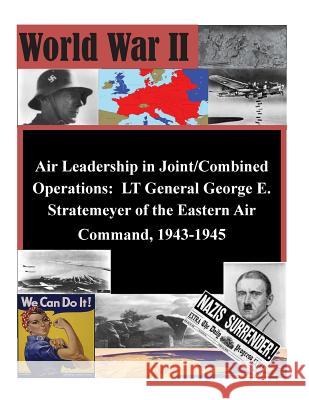Air Leadership in Joint/Combined Operations: LT General George E. Stratemeyer of the Eastern Air Command, 1943-1945 » książka
Air Leadership in Joint/Combined Operations: LT General George E. Stratemeyer of the Eastern Air Command, 1943-1945
ISBN-13: 9781505360554 / Angielski / Miękka / 2014 / 86 str.
Air Leadership in Joint/Combined Operations: LT General George E. Stratemeyer of the Eastern Air Command, 1943-1945
ISBN-13: 9781505360554 / Angielski / Miękka / 2014 / 86 str.
(netto: 56,82 VAT: 5%)
Najniższa cena z 30 dni: 59,50
ok. 16-18 dni roboczych
Dostawa w 2026 r.
Darmowa dostawa!
This book analyzes the career of Lieutenant General George Edward Stratemeyer, USAF, emphasizing his leadership in joint/combined operations in the China-Burma-India theater during World War II. Specifically, it demonstrates how, from his position as Chief of the Air Staff under General Arnold, General Stratemeyer witnessed the evolution of US interests as well as the buildup of forces in CBI and the creation and employment of the Northwest African Air Force under command of General Carl Spaatz. These two experiences colored General Stratemeyer's initial conception of his responsibilities as air commander of a combined USAAFRAF air organization in the CBI, the Eastern Air Command. His airminded perspective and genial nature enabled him to overcome early shortfalls in this conception and greatly contribute to the overall winning strategy employed by the Allies in Burma Under his command, individual air commanders were allowed to innovate and thus make the most of the meager resources at hand and, as a consequence, Eastern Air Command was instrumental in the combined arms operations that drove the Japanese completely out of Burma by May 1945. The key lessons derived from this book are four. The first is that there is no single template for coalition organization or operations. The US will fight in coalitions in future but every situation is unique and will call for an organization and pattern of operations that may differ significantly from those existing or envisioned in peacetime. The second key lesson is that doctrine and innovation are most important in a resource-constrained combat environment. The Allies in Burma were resource limited by virtue of CBI's tertiary priority in the war effort against the Axis powers. Today's US military will face similar constraints in time of war; they will have to fight with a relatively small force, with long lines of communication connecting the domestic economy to the fighting front, and in a joint/combined environment on a relatively limited budget. Arguably the most important finding of this book is that effective communication of the air perspective is an airman's most important contribution to military operations. General Stratemeyer was able to convince Allied surface forces leadership in CBI that airpower could contribute decisively to the combined arms effort; that they listened to him can be attributed to the final important lesson of this study-personalities are important in the leadership of joint/combined operations. All US military members should remember that the services are coequal, independent, and increasingly interdependent and that there is a unique perspective that comes from being educated, trained and raised in a parent service. Only an airman can adequately provide the air perspective.
Zawartość książki może nie spełniać oczekiwań – reklamacje nie obejmują treści, która mogła nie być redakcyjnie ani merytorycznie opracowana.











